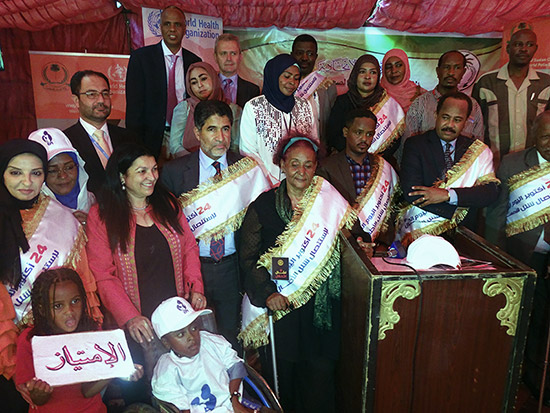 WHO Regional Director Dr Ahmed Al-Mandhari (third on left) attending Sudan's celebration on World Polio Day in Khartoum on 24 October 2019
WHO Regional Director Dr Ahmed Al-Mandhari (third on left) attending Sudan's celebration on World Polio Day in Khartoum on 24 October 2019
Khartoum, 27 October 2019 – The Government of Sudan, in partnership with World Health Organization (WHO), the United Nations Children’s Funds (UNICEF) and other health partners supporting the national polio programme in Sudan marked World Polio Day on 24 October and the declaration of the global eradication of poliovirus type 3 strain.
The celebrations involved a series of awareness-raising activities and emphasized the importance of the continuing support of the international community in eradicating remaining type 1 virus.
“The Government of Sudan, WHO, UNICEF and all partners have achieved a milestone success in keeping the country polio free and protecting our children against this crippling and fatal infectious disease,” said Dr Akram Ali Altoum, Federal Minister of Health in Sudan. “We need to continue advocating for a strong routine immunization programme in Sudan. We hold ourselves and our community members accountable for maintaining a polio-free Sudan,” he added.
Sudan has not reported a case of polio since March 2009 and was announced polio-free in 2015 by WHO’s Regional Certification Committee. Over 95% of children have been immunized with the polio vaccine, thanks to the strong collaboration between the Federal and State Ministries of Health and partners, and with the generous support of donors such as the Bill & Melinda Gates Foundation, Rotary International, the US Centers for Disease Control and Prevention, Gavi, the Vaccine Alliance, the United Kingdom’s Department for International Development, the United States Agency for International Development and the Norwegian Agency for Development Cooperation.
“The world can only overcome the final hurdles to completely eradicate polio if the present strategies put in place to reach and vaccinate children everywhere in the world receive sufficient resources and commitment from governments, donors, multilateral organizations and local communities,” said Dr Naeema Al Gasseer, WHO Representative in Sudan. “The eradication of polio is a global endeavour and to succeed, we should leave no child behind. Every child must be immunized until this deadly disease is eradicated and the whole world is polio-free,” she added.
“Awareness of the community and their active engagement is critical to eradicate polio and sustain the gains made so far,” said Mr Abdullah Fadil, UNICEF Sudan Country Representative. “During this critical time we should not forget about the children living in areas inaccessible since 2011, peace is crucial as it will let us reach those children in the Nuba Mountains in South Kordofan state and Blue Nile state under the control of the Sudan People’s Liberation Movement North,” he added.
Despite the successes, challenges remain and require innovative approaches to regain global momentum toward the full eradication of polio and maintaining routine immunization coverage to eliminate the conditions for the virus to transmit and spread.
WHO, UNICEF and nongovernmental health partners in Sudan will continue to support the Ministry of Health to maintain the current sensitivity of surveillance and increase vaccination coverage in the country.
For more information, please contact:
Ajyal Sultany
WHO Communications Officer
هذا البريد محمى من المتطفلين. تحتاج إلى تشغيل الجافا سكريبت لمشاهدته.
Fatma Naib
Chief of Communication and Advocacy UNICEF Sudan
هذا البريد محمى من المتطفلين. تحتاج إلى تشغيل الجافا سكريبت لمشاهدته.
About World Polio Day
World Polio Day was established by Rotary International to commemorate the birth of Jonas Salk, who led the first team to develop a vaccine against poliomyelitis. Use of this inactivated poliovirus vaccine and subsequent widespread use of the oral poliovirus vaccine, developed by Albert Sabin, led to the establishment of the Global Polio Eradication Initiative (GPEI) in 1988. Today, GPEI has reduced polio worldwide by 99.9%.
About WHO
WHO is a specialized public health organization mandated to provide the most reliable and evidence-based technical assistance, strategic and operational guidance to countries worldwide.
WHO works closely with Sudan’s Ministry of Health and related sectors on daily bases to identify priorities and guide the health sector on preparedness, effective and efficient response to health and health care requirements.
About UNICEF
UNICEF promotes the rights and wellbeing of every child, in everything we do. Together with our partners, we work in 190 countries and territories to translate that commitment into practical action, focusing special effort on reaching the most vulnerable and excluded children, to the benefit of all children, everywhere.
Related links
Sudan prepares to vaccinate over 11 million children against measles and polio
Sudan implements subnational polio immunization campaign to vaccinate 45 million children
Sudan kicks off July national immunization campaign





